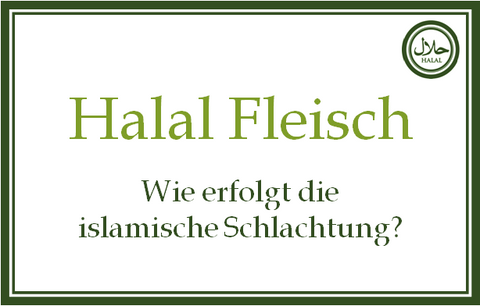What does halal mean? | Halal meat & slaughter explained simply
What does halal mean?
The word "halal" comes from Arabic and means "permitted" or "acceptable." Halal therefore refers to all lifestyles, actions, and foods that are permitted under Islamic law. The opposite of "halal" is "haram," which means "forbidden." For example, the consumption of pork and pork gelatin in sweets is haram—i.e., forbidden—for Muslims (you can find sweets that are permitted for Muslims and do not contain pork gelatin here). Which actions and foods are halal (permitted) and haram (forbidden) for Muslims is determined by the writings of the Koran and the way of life of the Prophet Muhammad (s).
Halal and haram are two principles that apply to all aspects of human life and coexistence. They concern everything that is part of life. Rights between people, family and neighborhood relationships, the treatment of animals, dealing with the environment, and even finance and banking, as well as the topic of nutrition, are just a few examples that are governed by the halal-haram principle.
Halal meat and the concept of Islamic slaughter
When considering halal-haram classifications, meat often receives the most attention. In order for a particular type of meat or meat-containing food to be classified as halal (Which foods are halal?), not only the choice of animal, but also the procedure for preparing and carrying out the slaughter, as well as the processing of various meat products, play a significant role. This article will focus on the preparation, conditions, and execution of slaughter.
Is Islamic slaughter the same as ritual slaughter?
Linguistically, the term "schächten" (slaughtering), which is known from Judaism, has become established in German usage for the Islamic method of slaughter. There are fundamental similarities to the concept of "kosher," but in order to avoid misunderstandings and overlaps in content, some certifiers differentiate between the two and summarize the "Muslim rules" under the name "Islamic slaughter."
The rules for Islamic slaughter—a guide
As with permitted (halal) and prohibited (haram) foods, there are also guidelines from certifiers for the slaughtering process itself. These are based on the Quran, the Sunnah of the Prophet Muhammad (s), and numerous legal opinions, and take into account the geographical conditions and technological possibilities in the age of industrial standards and automated processes. According to the following guidelines of the European Halal Certification Authority
- Only permitted (halal) animals may be slaughtered (i.e., no pork).
- The person performing the slaughter must be Muslim.
- the slaughtered animal must bealiveduring this process.
- Anesthesia methods may be used to protect against pain and suffering* (more information on this point can be found below).
- However, the animal must not have died as a result of the stunning or otherwise before the decisive cut.
- must be slaughtered in the name of Allah.
- Under no circumstances may the animal be tortured or subjected to stress and/or suffering.
- Any transport to the slaughterhouse should be as gentle as possible.
- The slaughter knives should be as sharp as possible in order to make a quick, clean cut.
- It is undesirable to break the animal's neck during slaughter.
- bleeding of the animal must be ensured.
Islamic slaughter according to halal criteria is performed by quickly cutting the windpipe, esophagus, and both carotid arteries below the larynx. At least three of the four areas mentioned must be cut.
As a general rule, you can follow this guideline:
During husbandry, transport, preparation, slaughter, and post-slaughter procedures, care must be taken to respect the animal as a creature of God and treat it with dignity.
The Prophet Muhammad (s) emphasizes this statement with the following tradition:
"Whoever is merciless (towards living beings) will not receive mercy (from Allah ta'ala)."
The tradition of the Prophet Muhammad (s) makes it clear once again that the question of halal does not only concern the choice of animal and the technique of slaughter, but also requires animal-friendly and species-appropriate treatment.
Halal is a universal concept that covers a wide range of areas, from animal husbandry to product processing. Since the idea of halal covers such a broad and far-reaching field, the next article will examine all the important aspects ofthe manufacturing and processingofhalal food.
Note on stunning procedures
The criteria mentioned all seem somewhat abstract. For greater clarity, two concrete examples will be discussed. The Quran and the Sunnah of the Prophet Muhammad (s) are the first two sources that define Islamic principles. These were communicated to humanity several hundred years ago. Stunning before slaughter is a classic example of the attempt to apply these principles to current technological standards and possibilities. That is why stunning, which did not play a role at the time of the Prophet, is now a frequently discussed issue. According to some scholars and certifiers, stunning is not permissible for various reasons. One of these reasons is the possible danger that the animal may already die as a result of stunning (cardiac arrest due to short-term electrical stunning, allergic shock to the anesthetic, etc.). This would mean that the meat would no longer be classified as halal after slaughter. For this reason, some Muslims avoid meat and other products from animals that have been slaughtered using stunning methods.
1Tradition from Al-Bukhari

 Log in
Log in

